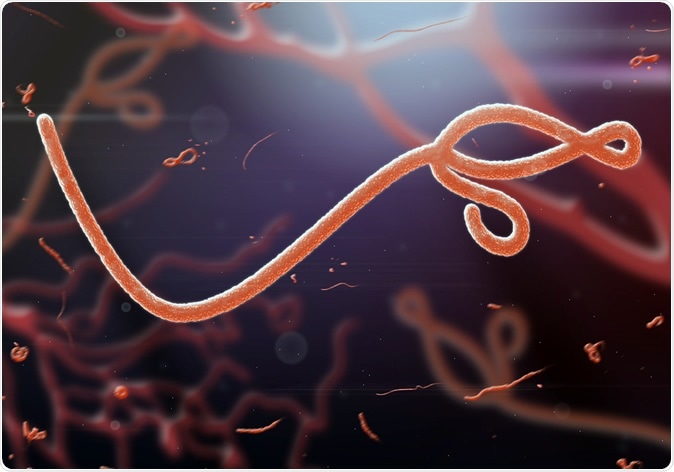The World Health Organization (WHO) declared the end of the latest Ebola virus disease (EVD) outbreak in the Democratic Republic of Congo (DRC) last Saturday. This comes at 42 days after the last confirmed case of Ebola. The experts have said that two incubation period cycles of 21 days have passed with no new cases and thus it can be safely said that the outbreak has ended.
The last confirmed patient was in the affected Bas-Uélé province and tested negative for the disease for the second time. WHO has assured that surveillance would continue as before in the country and the teams would be prepared to handle and manage outbreaks of Ebola.

Microscopic view of the Ebola virus (Illustration). Image Credit: jaddingt / Shutterstock
Dr Tedros Adhanom Ghebreyesus, WHO Director-General said that this end of the epidemic of Ebola signifies that Democratic Republic of Congo is capable of controlling and combating the deadly Ebola virus. The efforts against the disease were early and in a efficient and coordinated way he said. This outbreak killed 4 persons while 4 more persons survived. Of these 8 cases, 5 were confirmed in the laboratory. There were total of 583 contacts of these 8 persons who were deemed to be at risk. They were closely monitored for this period. However none of them developed Ebola virus infection or signs and symptoms of the condition.
WHO was notified on the 11th of May this year by the Ministry of Public Health that there was presence of a cluster of undiagnosed illnesses leading to deaths. Many of them had signs of bleeding or hemorrhagic complications. The cases came from Likati Health Zone. Likati is a difficult to reach area near the borders of Central African Republic and two other provinces of DRC. More cases and their reports came from four health districts. This was the eighth outbreak of EVD since 1976 when the virus was first detected.
As soon as the initial reports came in the team of healthcare workers were prepared to take up the challenge. The local authorities alerted the team of suspect cases. There was immediate laboratory blood testing for the virus and an announcement could be made by the government as soon as positive results came in. Local and national health authorities along with international help and a good access to laboratories and funding responded immediately. WHO Health Emergencies Programme provided local support at the sites of action. An Incident Management System was set up within 24 hours of the outbreak being announced. Over 50 experts in the field were deployed by the WHO to work with local health care providers.
Dr Matshidiso Moeti, the WHO Regional Director for Africa, praised the efforts of the country and its commitment to initiate response and to strengthen the local capacities. She added that partnering with effective and efficient teams would only strengthen the health care delivery system and also raise the preparedness at different levels. Not only treatment was provided to the victims, but also screening for the infection among contacts, psychological support, counseling and general public education and awareness was also focused upon. She had visited DRC in May after the initial reports.
Dr Oly Ilunga Kalenga, the country’s Minister of Health, announced the end of the outbreak stating that this was the time to strengthen the health care system in Bas- Uélé province. The province had been badly hit and strengthening would ensure effective surveillance.